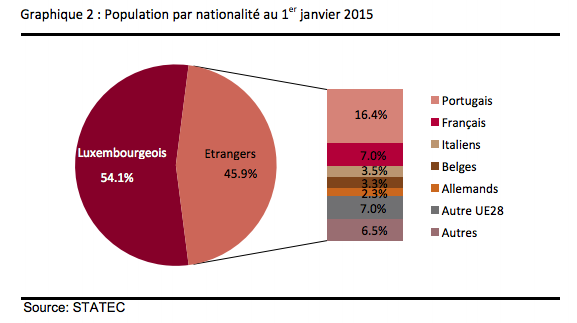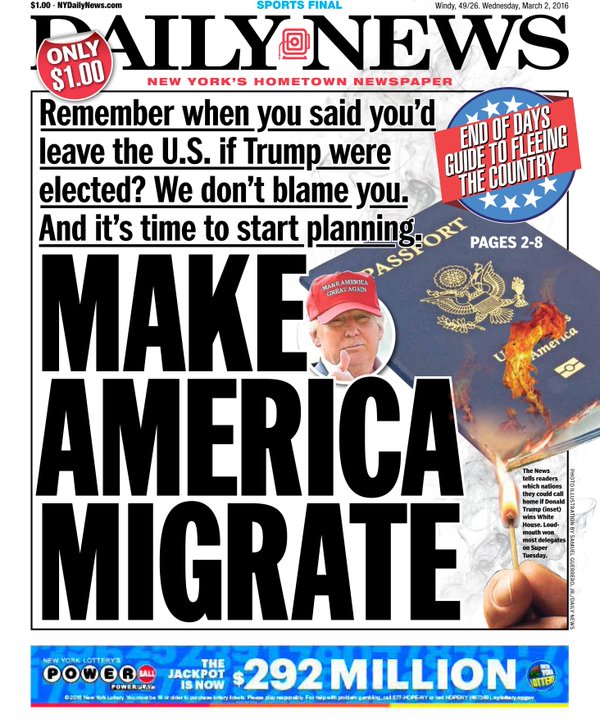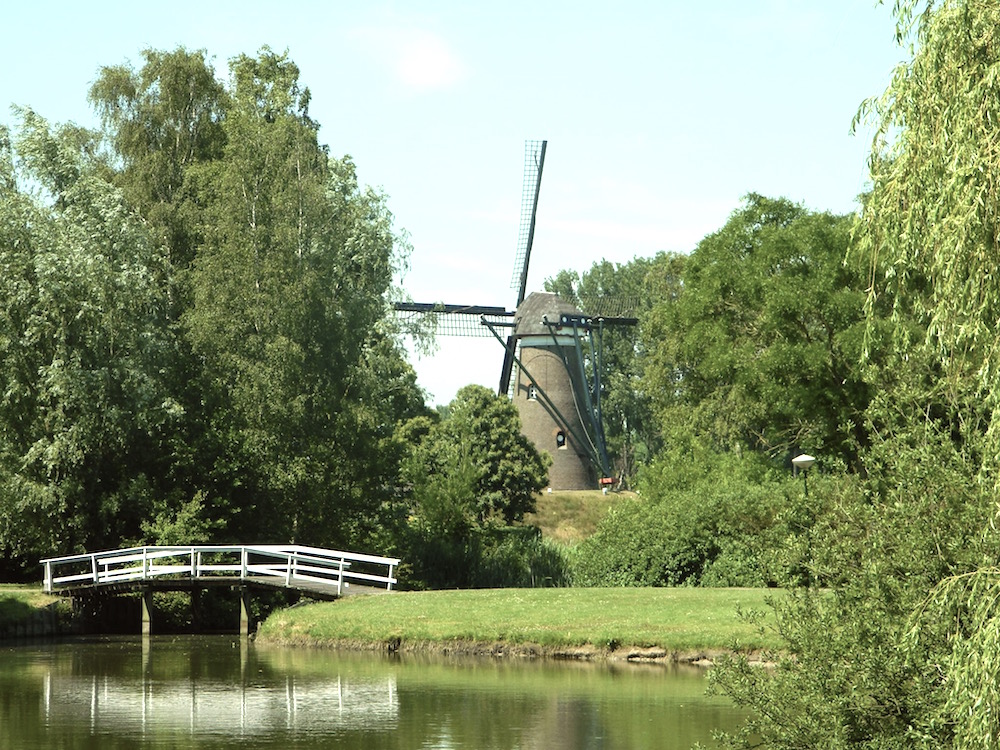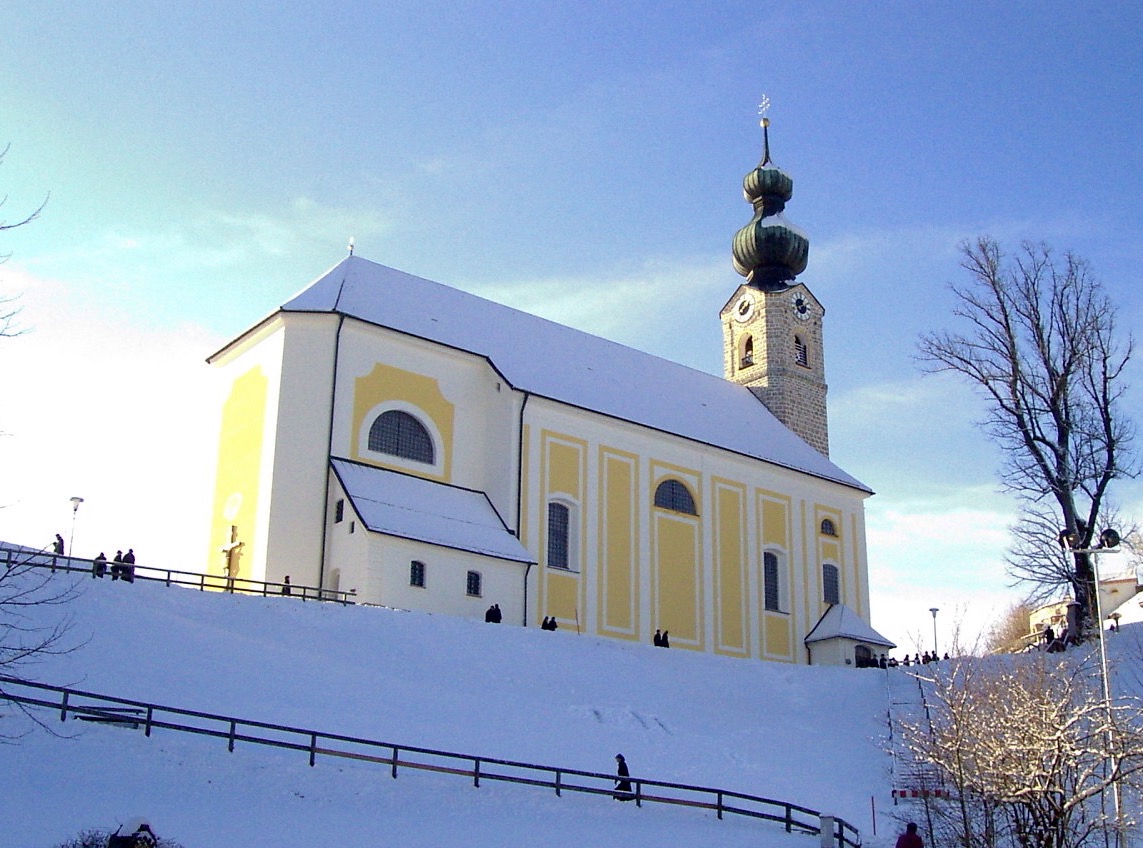(Editor’s note: This post ran in May. Since then, the U.S. presidential election has only gotten weirder, so we’re reposting with updates.)
What’s that? You can’t believe Donald Trump might be the next president of the United States of America? And you’re not that crazy about Hillary, either?
Whether it’s luck or fate, we’re starting Dispatches Europe at the very time an increasing number of Americans are considering their expat options for the next four years or so. In fact, there’s a recent poll indicating one in four Americans would consider leaving if Trump is elected. Others claim they will leave if Hillary Clinton is elected. In terms of trend lines, more Americans are renouncing their citizenships.
(T)he number of published expatriates for the first three months of 2016 was a record 1,158. In 2015, there were approximately 4,300 expatriations. Comparing present to past suggests that Americans renouncing citizenship have risen 560 percent from their Bush administration high. There are now 18 times as many renouncers as in 2008.
To that end, we’ve put together lists of the most welcoming countries in Europe, the countries that – in our experience – offer the best alternatives to living in the States in practical and cultural terms. We stress “practical,” because the truth is, there are limited paths to gaining long-term residency status in Europe.
There’s the dreamy dream – you, Hemingway and Johnny Depp drinking Kir Royales, kicking back with Eva Green in the South of France. In that scenario, you just choose one of 19 countries of Western Europe based on Michelin-starred restaurants and natural beauty. And that’s certainly the way to go if you’re George Clooney (who lives in Italy) or Tina Turner (who has Swiss citizenship.) Or my sister Marge, who’s Greek half the year.
 Also, you can buy residency in countries such as Portugal, Spain and Malta by simply buying property, or investing in a business. If you’re even vaguely wealthy, this could be your best play, because capital requirements can be really quite low – as little as 250,000 euros in Greece. (It’s no coincidence that countries with the best deals are also the countries with Europe’s oldest populations, and lots of pensions to pay.)
Also, you can buy residency in countries such as Portugal, Spain and Malta by simply buying property, or investing in a business. If you’re even vaguely wealthy, this could be your best play, because capital requirements can be really quite low – as little as 250,000 euros in Greece. (It’s no coincidence that countries with the best deals are also the countries with Europe’s oldest populations, and lots of pensions to pay.)
And then there’s the reality for the rest of us:
Most Americans end up here one of three ways – their multi-national corporation sends them, Uncle Sam sends them as soldiers, spooks or diplomats, or they go as a student and meet a European and get married.
A sub-category of American expats includes the ultra-rich, celebs and movie stars looking for a place to relax away from the spotlight. If you have a few million bucks, every country throws out the welcome mat including Monaco, Liechtenstein and San Marino.
But trust us … after dealing with residency visas and other bureaucratic requirements for the past eight months, there’s a lot more to it than choosing between mountains and beaches.
 No matter which country you choose, get ready to jump through a lot of hoops and jump quickly, because if you’re freelancing this little escapade, you generally only have 90 days on your tourist visa total in Europe to start the process in the European Union under the Schengen Rules.
No matter which country you choose, get ready to jump through a lot of hoops and jump quickly, because if you’re freelancing this little escapade, you generally only have 90 days on your tourist visa total in Europe to start the process in the European Union under the Schengen Rules.
That is, you can’t spend 90 days in Netherlands, then move to, say, a beach in Greece and get another 90 days. It’s very, very difficult to get a 90-day extension unless you’re literally laid up in the hospital. So, if you can, start the process before you leave the U.S. … though that strategy presents its own problems.
Also, get ready to pay higher taxes in return for incredible infrastructure and health care. If you’re envisioning a single-family house on a large parcel of land in your new country, bring a Warren Buffet bank account. Otherwise, 1,500 square feet of apartment is considered luxurious.
Welcome to Europe.
Finally, American expats (and only American expats) get to pay taxes in both their adopted country and in their country of birth. (Well, there goes half of you ….)
We’re going to start with the Netherlands because we know it best. And more than one source ranks it the best place in Europe to start a business, or relocate your existing enterprise.
HOLLAND
The Netherlands has (in our opinion) a quality of life that equals, or surpasses, Germany, Switzerland and Luxembourg, yet is probably the easiest to negotiate. And despite its reputation as a high-tax destination, most people making average middle-class salaries here pay a personal income tax rate that’s comparable to the state of Pennsylvania, according to our experts.
(Trust me, Dispatches has consulted more attorneys, accountants and advisors in the last eight months than the entire time we were in business in the States.)
Ah, but there’s so much more, including mandatory participation in the Dutch health care scheme. (In Europe, unlike the U.S., “scheme” simply means “plan” or “system,” not a nefarious caper.) Bottom line: The Dutch are okay with simply keeping less of their gross pay than Americans.
Telling you in granular detail about the Netherlands would require a book (and there is one we can recommend – the Holland Handbook.)
Ease of access:
Here’s the deal. The Netherlands, like every other country on the planet, wants talent and taxpayers. And, preferably, taxpaying talent. You’re going to hear the phrase “in the economic interests of the country” a lot, because that’s pretty much the criterion for deciding whether you get a long-term residence visa in Holland, Switzerland or wherever.
Holland and most EU countries will accept migrants if they have skills in short supply here, or are coming to work as highly skilled migrants for a big corporation. Does Holland need more hipsters writing poetry at coffee shops (yeah, those coffee shops) in Amsterdam or starting kebab stands? No.
If you’re a top-rung tech talent, accountant, physicist, engineer, researcher, corporate hotshot or entrepreneur with talent and capital, the Netherlands will give you two years of residency under the Dutch American Friendship Treaty. If you want to start a company in the Netherlands, the Dutch are all for it. But there are a lot of decisions to make, because your visa and your company structure impact one another.
For example, if you select the BV, the equivalent of a Limited Liability Company or LLC, you have to figure out a way to pay yourself as director 55,000 euros annually, and pay about 1,000 euros per month in payroll taxes, which doesn’t include the other taxes you have to pay on income. And don’t forget the mandatory health insurance scheme.
There are other options that don’t require the big salary, including a new startup visa (which apparently is a work in progress, with only a few granted), partnerships, sole trader and as a branch of a foreign company. But any way you go, you’re going to have to put up a little money – typically 4,500 euros – as a reserve you can’t touch. And, you’re going to have to open both a business account and a personal bank account. And opening a business account is a nightmare. (More to come on that next week.)
Finally, your residence visa application is scored on a basis of points.
But we’re getting way ahead of ourselves. You can’t really do any of this until you start the application process for a long-term residence visa.
Here’s the bottom line … you might need an attorney to get you through the process, because if you make a mistake or a poor choice, it’s hard to get a do-over from immigration authorities and tax officials. Having an attorney makes you feel more comfortable, but in retrospect, we could have done it ourselves.
But again, the Netherlands is open for business, and that makes it an attractive choice for both liberals escaping Trump, and conservatives fleeing Hil.
Remember, the Netherlands is still the low-cost business leader in Europe, retaining its No. 1 ranking in Europe and No. 3 ranking overall on KPMG’s Competitive Alternatives 2016 survey.
What’s it like to actually live in the Netherlands:
One of Holland’s biggest selling points for English-speaking expats looking for a place to land is everyone here – and I mean everyone – speaks English.
Living in the Netherlands takes some getting used to for Americans … for all the right reasons. The Dutch (generally) aren’t workaholics. If the weather is even vaguely warm, at 3 p.m. on Friday, the cafes fill up, and they stay that way all night.
I’ve been in and out of the Netherlands since I was in college, and I still don’t know how it works.
No one here is killing themselves working like the U.S., yet this is one of the most affluent countries in the world. I think most of the wealth comes from incredibly strong business sectors such as medical technology, insurance, finance, shipping and logistics, and high-tech manufacturing.
Will you fit in? Maybe … but don’t expect special treatment. Americans are one flavor of emigres in this exceedingly diverse country of 19 million that include people from former Dutch colonies such as Surinam, Arabs, Turks, Italians, Russians, Bosnians and the rest.
Now, if you want to make friends, here’s a tip: Join a group. The Dutch are big on groups. If you join the local golf club, for example, you likely will become a mini-celebrity/oddity as “our American.”
A caveat:
If you’re an American like me – loud, confrontational and aggressive – you’re going to have to change your personal style. If you remember nothing else from this post, remember this: The Netherlands is a high-tolerance, low-tension country where people put a premium on modesty and consensus. No screaming, no road rage and no bullying. And above all, no bragging about how smart and successful you are. Just don’t. Also, if you’re looking for a country that replicates 1950s American, Holland ain’t the place. This is a very secular, integrated and progressive 21st-century society. In fact, with the exceptions of Poland and Hungary, social conservatives and Bible thumpers should probably cross all of Europe off their lists. Try Central America or Uganda.
Our runaway-worthy rating on a scale of 10: 10
GERMANY
Germany is Europe’s mega-economy, the fourth-largest on earth behind the U.S., China and Japan. It’s also an aging society, so they – like most of Europe – need talent. And just like in Holland, if you have skills that companies need, you’re in.
Ease of Access:
If you want proof that Germany is a viable alternative for American expats, just go to Berlin, where so many Americans work at established tech companies and startups. Americans get residence visas all the time. BUT, the amount of stuff you have to do is probably more onerous than the Netherlands, including producing a certificate of health and – believe it or not – a certificate of good conduct.
(Full disclosure … my family lived in Germany under the Status of Forces Agreement, with Uncle Sugar handling all our immigration requirements. Joining the military … there’s a thought.)
What’s it like to live there:
Living in Germany takes some getting used to for Americans. There are sooooo many rules. Rules on when you can cut grass. (Never on Sundays.) Rules on when retailers can be open. (Never on Sundays, and not after 4 p.m. on Saturdays) Bizarre requirements for getting a bank account. You get taxed on everything down to the radio in your car. Seriously. We lived in Germany for almost five years, and never quite got used to it. But, I know dozens of Americans who went to Germany and never left. On so many levels, quality of life is exceptional.
Moreover, unlike the Netherlands, Germany is a large and diverse country. Living in a conservative and sometimes impoverished rural area is completely different than living in super-affluent cities in Bavaria such as Munich, where people are more relaxed. (I remember fondly a night in the Bavarian ski resort of Rupolding with my sisters, singing along after dinner with a restaurant full of slightly inebriated new friends.)
While our village in Rhineland-Pfalz wasn’t welcoming, if we went to the next village over the mountain, the people were awesome. All the American military families and retirees we knew had close German friends. So Americans fit in. But you’d better learn to speak German, because outside of Berlin, Frankfurt and the big cities, most Germans aren’t fluent in English.
The travel options are limitless inside Germany, and you’re positioned perfectly in the middle of Europe.
Our runaway-worthy rating on a scale of 10: 9.5 out of 10.
SWITZERLAND
We’re including a brief look at Switzerland for our friends among the 1 Percent, and all our expat Formula 1 drivers. I was in Geneva in 1984 when Richard Burton died. I thought to myself at the time, Dick died in the country closest to heaven.
Ease of Access:
Because Switzerland is the wealthiest nation on Earth (technically, it swaps back and forth with Luxembourg), the Swiss have always been pretty choosy about who they let in. Now, they’re even more so, with new employment tests and quotas for all countries (including the U.S.). Yet, foreigners make up something like 30 percent of the population, so it’s doable. If you’re a retiree or a student with resources, you can stay as long as your money holds out! Also, Switzerland – like most European countries – has a clause in its immigration code that if you make it 10 years with your nose clean and finances intact, then you’re eligible for Swiss citizenship. Which is equal in value to American citizenship when it comes to global mobility.
Here’s a very detailed website dedicated to entering and staying in Switzerland,
What’s it like living there:
When I was in college, I go to meet a friend in Geneva. I grab the phone book when I get there, and I noticed everyone is listed not just by name and phone number, but occupation. Switzerland is like that. Hierarchical. Status obsessed. But when we used to visit Switzerland all the time, we met so many expats including Americans who loved living there. My cousin Mayling loved her time living in Geneva on assignment with the World Bank.One couple we met in Basel told us that town in particular has the most cellists in the world. A country unmatched for access to the arts and culture, which are so important.
Switzerland has four official languages – French, German, Italian and Romansch. Five counting English, because most people in the cities are totally fluent.
Switzerland is a dream … one that’s only realistically obtainable for the wealthiest.
Our runaway-worthy rating on a scale of 10: 11 out of 10. But that’s just us …
LUXEMBOURG
 The Duchy of Luxembourg is a funny place. It’s got one small, ultra-wealthy city, loads of chateaux and castles, lovely farms and steel mills. It is, as my wife Cheryl says, “a fussy little country.”
The Duchy of Luxembourg is a funny place. It’s got one small, ultra-wealthy city, loads of chateaux and castles, lovely farms and steel mills. It is, as my wife Cheryl says, “a fussy little country.”
It also has a population that’s about 45 percent foreign-born, the majority of whom are Portuguese, because Luxembourg had to actually recruit people to live there, it’s that boring. But it’s also peaceful and stable … which is worth a lot in the 21st century.
Of the tens of thousands of people who immigrate to Luxembourg, 94 percent come from other EU countries including France and Italy. Maybe 6 percent come from outside the EU.
For the right person, Luxembourg could be just the place to sit out four bad years in America.
Ease of access:
Luxembourg is not just an EU country, it’s one of three EU capitals, and home to the European Court of Justice. So Schengen Rules apply. You have to be ready to submit a valid passport, birth certificates for all family members, marriage or divorce certificates, proof of capital and assets, and proof of school admission for your kids.
Oh, and everything has to be translated. It usually takes three months for immigration authorities to say yea or nay.
What it’s like living there:
The dominant language is French, followed by Luxembourgish, but everyone speaks English.
We’ve never lived in Luxembourg, but we’ve been there who knows how many times. It has a lot most outsiders don’t know about including the Mullerthal area of forests and streams that everyone calls “Little Switzerland.” And the quality of life and nature sort of reminds one of Switzerland and France.
That said, I’ve never, ever heard anyone say, “I going to run away to Luxembourg.”
Dispatches’ runaway-worthy rating on a scale of 10: 8 out of 10.
Next, we’ll look at Scandinavia. It’s Bernie Sanders’ ideal. But is it right for you?
Co-CEO of Dispatches Europe. A former military reporter, I'm a serial expat who has lived in France, Turkey, Germany and the Netherlands.


















